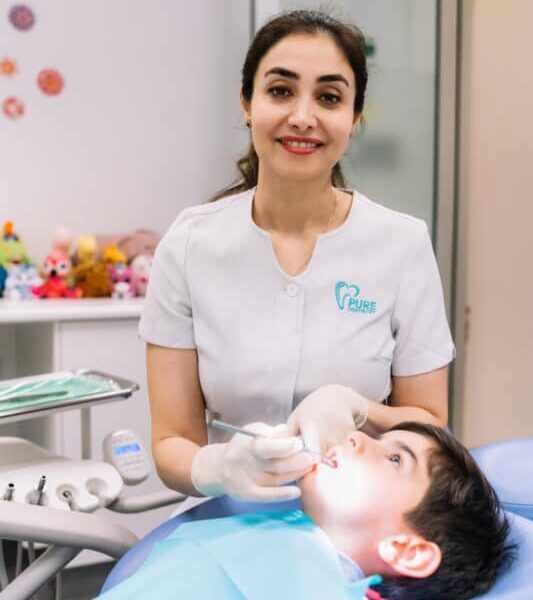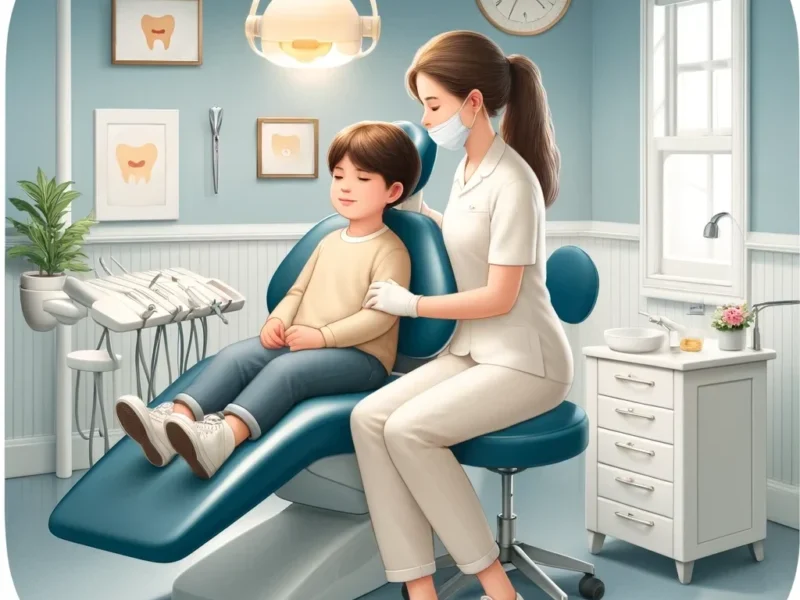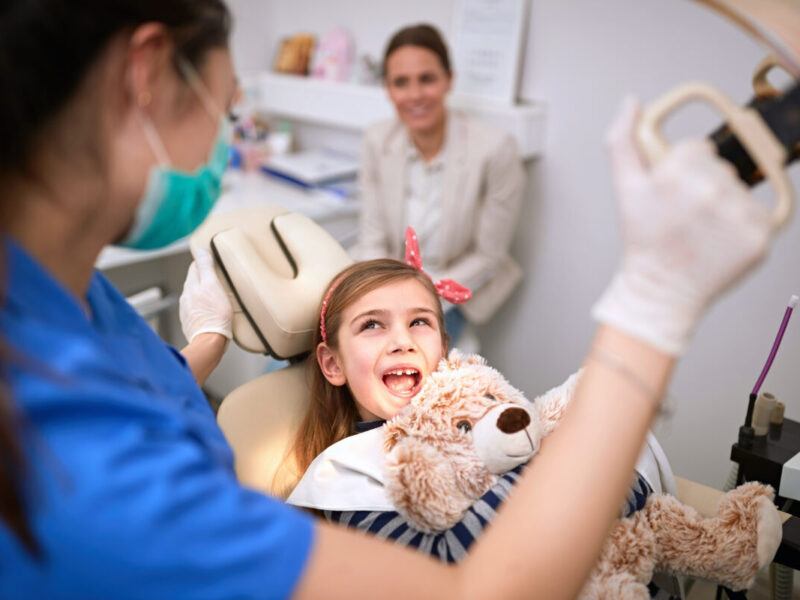Overcoming Barriers to Dental Care for Children with Autism
Managing dental health for children with autism involves unique challenges that can feel overwhelming for both the child and their caregivers. This article addresses the barriers to dental care for children with Autism, highlighting common issues faced at home and during dental appointments.
We will offer straightforward, practical advice to help you overcome these obstacles and improve your child’s dental care experience. Our goal is to support families and caregivers by providing the knowledge and tools needed to navigate these challenges with confidence.
Barriers to Dental Care for Children with Autism at Home
Caring for a child with autism involves understanding their unique needs, especially when it comes to dental hygiene. At home, parents or caregivers may face several obstacles that can make maintaining oral health challenging.
Sensory Sensitivities
Many children with autism are highly sensitive to sensory input. This means the feel of a toothbrush or the taste of toothpaste can be uncomfortable or even overwhelming. Bright bathroom lights or the sound of an electric toothbrush might also be too much for them. To help, try using softer toothbrushes and milder toothpaste flavours. Gradually introducing dental care routines can also reduce anxiety and resistance over time. It’s about finding what feels best for your child and adapting the process to their comfort level.
Routine Rigidity
Children with autism often thrive on routine and predictability. Introducing new activities like brushing or flossing can disrupt their sense of stability. To integrate dental care into their routine, start slowly by scheduling it at the same time every day. Consistency helps build a reliable routine, making dental care a regular part of their day. Over time, this consistency can turn a new task into a comforting routine that they are less likely to resist.
Communication Difficulties in Dental Care for Children with Autism
Explaining the importance of dental care to a child with autism can be tough if they have communication barriers. Use simple, clear words and consider visual aids or demonstrations to help them understand. Showing them what you’re doing and involving them in the process can make a big difference. Also, listening to their needs and watching for non-verbal cues can help you adjust the routine to better fit their understanding. Patience and continuous interaction are key to overcoming these communication challenges.
Motor Skills Challenges
For children with autism, fine motor skill difficulties can make brushing and flossing a hard task. Using toothbrushes with larger handles can make gripping easier, or you might consider electric toothbrushes that require less manual dexterity. Engage in activities that enhance motor skills outside of dental care to help improve their ability to handle a toothbrush. This might include games or therapy that focus on hand-eye coordination and grip strength. Every small step can make dental care more accessible for them.
Cognitive Aspects of Dental Care for Children with Autism
Grasping the concept of dental hygiene can be difficult for children with autism, especially if they have cognitive delays. Break down the process into simple, easy-to-understand steps and repeat them regularly. Use consistent, straightforward language and perhaps integrate story-telling or use characters they like to illustrate the benefits of brushing and flossing. Reinforcing the routine with positive reinforcement can also help solidify these habits. Remember, the goal is to make dental care understandable and meaningful on their terms.
Simple Changes at Home to Improve Dental Health
Making a few adjustments at home can significantly enhance the dental health of a child with autism, especially for those who face sensory challenges. Start with choosing the right dental products. Soft-bristled toothbrushes or those designed with comfort-grip handles can make brushing more comfortable and easier to manage. Look for toothpaste with mild flavours, as strong mint or fruity flavours might be overwhelming for sensitive tastes.
Establishing a Comforting Routine
It’s also beneficial to establish a routine that your child can anticipate. Brushing teeth after breakfast and before bed creates a predictable pattern that can ease anxiety. During brushing, consider using a timer with a gentle sound to indicate when it’s time to start and finish, which helps integrate time awareness and duration understanding into the routine. Encouraging your child to select their own toothbrush and toothpaste can also foster a sense of involvement and control over the process.
Creating a Supportive Environment
Lastly, keep the environment in mind. A calm, softly lit bathroom with minimal distractions can help reduce sensory overload during dental care times. Simplifying the dental care routine and creating a supportive environment can make a big difference in your child’s oral health and their overall comfort with the process.
Barriers to Dental Care for Children with Autism During Dental Visits
Visiting a kids’ dentist can be daunting for children with autism due to unfamiliar settings and routines. These visits can present various challenges that need careful consideration and adaptation.
Unfamiliar Environment
A dental clinic is a new space filled with unknown sights and sounds, which can be very unsettling for a child with autism. The presence of new faces, dental tools, and the clinic’s layout can trigger anxiety. To help, clinics can offer pre-visit tours or use virtual tours online so the child can familiarize themselves with the environment calmly at home. Keeping the same dentist and dental room for each visit can also help the child feel more secure and less anxious.
Fear of the Unknown
Not knowing what to expect during a dental appointment can be a major source of stress for children with autism. Detailed explanations of each step, using simple language and visual aids, can help make the process more predictable. Some dentists also use storyboards or apps designed to walk through the dental visit in advance to ease this fear.
Physical Restraint
The need to stay still during dental procedures can be challenging and scary. Using comfort items like weighted blankets or allowing a parent to be close by during treatment can help alleviate the need for physical restraint and make the child feel safer. Encouraging short, frequent visits to gradually desensitize the child to the experience can also be beneficial.
Communication Gaps
Effective communication tailored to a child’s individual needs is crucial but often lacking. Brisbane Paediatric Dentists and staff who are trained in non-verbal communication techniques or the use of alternative communication aids can bridge this gap. It’s important for dental professionals to work closely with parents to understand the best way to communicate with their child.
Sensory Overload
The bright lights, loud noises, and tactile sensations of a dental office can overwhelm a child with autism. Dental practices can mitigate this by offering sensory-friendly appointments where the lighting is dimmed, background noise is reduced, and fewer patients are scheduled at the same time. Providing headphones or allowing the child to hold a familiar object during the visit can also help.
Lack of Specialized Training
Not all dental practices are equipped with the knowledge or resources needed to cater to children with autism. Seeking out clinics that specialize in treating patients with special needs or those with staff trained in special education can provide a more supportive and understanding environment. This training helps dental professionals create a more accommodating and positive experience for the child and their family.
Practical Tips for Parents Preparing for a Dentist Visit
Preparing for a dental visit can significantly reduce anxiety for both you and your child with autism. Here are some practical strategies to make dental appointments smoother and less stressful.
Start with Pre-Visit Discussions: Talk to your child about the dentist in a positive, calm way. Explain what will happen using simple terms. You can use picture books about dental visits or short, informative videos designed for children to help them understand the process better.
Visit the Clinic Beforehand: If possible, visit the dental clinic together before the actual appointment. This allows your child to become familiar with the environment. Seeing the dentist’s office, the chair, and even meeting the dentist can help demystify the experience.
Use Desensitization Techniques: Gradually introduce your child to the sensations associated with dental care. This can include practising opening their mouth for a toothbrush at home or using a small flashlight to mimic the dentist’s light. Make these practices short and frequent to build tolerance slowly.
Create a Predictable Schedule: Try to schedule dental appointments at a time when your child is usually most calm and content. Keeping the appointment at the same time of day for each visit can also help in creating a predictable routine that is easier for your child to handle.
Bring Comfort Items: Allow your child to bring a favourite toy or a blanket to the appointment. This can provide a sense of security and comfort in a new or stressful setting.
Communicate with Your Dentist: Make sure your dentist is aware of your child’s needs and any sensitivities they might have. Sharing strategies that work well at home can guide the dentist in how to approach the visit to make it as reassuring as possible for your child.
What to Look for in a Dentist for Your Autistic Child
Choosing the right dentist for your autistic child is crucial to ensuring their dental visits are as comfortable and beneficial as possible. Here are some key traits and skills to look for in a dentist to make sure they can meet your child’s specific needs.
Specialised Training and Experience: Look for a dentist who has specific training in dealing with children with autism. This training not only covers the technical aspects of dental care but also includes how to approach, communicate, and interact effectively with autistic patients.
Patience and Understanding: A good dentist for your child should be patient and empathetic. They should take the time to understand your child’s needs and be willing to adapt the dental examination to those needs. This might mean allowing extra time for appointments or breaking down the visit into shorter, more manageable segments.
Clear Communication: Effective communication is essential. The dentist should be able to explain procedures in a straightforward manner and use clear, simple language that your child can understand. They should also be open to communicating with you about how best to approach the visit and incorporate any specific strategies that work well for your child.
A Calming Environment: The dental office should offer a calm and welcoming environment that can help ease your child’s anxieties. Some dental practices have specific accommodations like quiet rooms or allow visits during less busy times so that the environment feels less overwhelming.
Positive Reinforcement Techniques: A Brisbane dentist who uses positive reinforcement can help make your child’s dental experience more rewarding. This might include praise, small rewards, or other encouragement throughout the visit to help your child associate dental care with a positive outcome.

How to Help Your Child Through Their Dental Appointment
Supporting your child during a dental visit can make a big difference to their comfort and the success of the appointment. Here are step-by-step tips and communication techniques that can help your child with autism have a more positive experience at the dentist.
Prepare Ahead of Time: Start by explaining the dental visit in a calm and reassuring manner a few days before the appointment. Use simple language and consider creating a visual storyboard or timeline of the visit to help your child understand what to expect.
Visit the Clinic Early: Arriving a bit early allows your child to adjust to the new environment without feeling rushed. It gives them time to explore the waiting area and gradually settle down.
Bring Familiar Items: Having a favourite toy, blanket, or even a book can provide comfort to your child. These familiar items can be a reassuring presence in a new or potentially stressful setting.
Use Calming Techniques: If your child feels overwhelmed, employ calming techniques that work for them. This might be deep breathing, listening to calming music through headphones, or watching a favourite video on a tablet.
Communicate with the Dentist: Make sure the dentist and their staff are aware of your child’s needs and the best ways to communicate with them. During the visit, encourage the dentist to use short, clear instructions and to allow your child to take small breaks if needed.
Offer Positive Reinforcement: Throughout the visit, provide positive feedback to your child for their cooperation and bravery. This can be words of encouragement or a promise of a small reward after the visit.






































